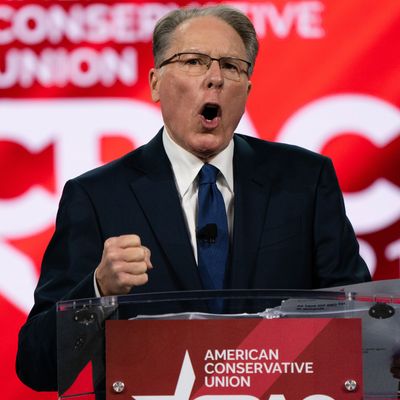
Of the many things on which a Democratic Washington cannot get legislation passed, the one where gridlock has reigned longest has been gun control (or, as poll-conscious proponents of efforts to reduce gun violence sometimes put it, “gun safety measures” or “sensible gun regulations”). Obstruction of any legislation on guns that isn’t designed to massively expand the ownership and use of ever-more lethal weapons is purely a function of partisan deployment of the filibuster these days; few, if any, Republicans would dare raise the subject, while even the most conservative Democrat in Congress, Senator Joe Manchin, was an original co-sponsor of the last nearly successful (if extremely modest) gun-control initiative in the wake of the Sandy Hook massacre.
As NPR’s Tim Mak explains in a Politico Magazine piece this week, the Manchin and Pat Toomey legislation of 2013 represented not just the most dispiriting defeat ever for the cause of gun-violence prevention but a turning point for the gun lobby and the GOP, which became radicalized on gun issues after rival groups attacked it for insufficient fanaticism. To make the long story short, the National Rifle Association’s lobbying arm was deeply involved in the negotiations that produced the Manchin-Toomey measure, which would have offered gun owners some scattered concessions in exchange for a tightening of the gun-purchasing background-check system to include most weapons sold at previously unregulated gun shows. But at the same time, the NRA’s public-relations wing began attacking the whole endeavor, and eventually the organization as a whole demonized it:
The divide between the lobbyists’ relative pragmatism and the all-or-nothing strategy of the enthusiastic PR firm highlighted the tension between competing factions of the gun group. Ultimately, in the dark wake of the shootings at Sandy Hook, the NRA jettisoned the idea of compromising through the legislative process and chose to double down on gun rights as identity politics.
There was a tactical turning point as well, even after the NRA abandoned any notion of supporting the bill it had helped shape: The NRA considered just not “scoring” it (i.e., including it in the list of votes that would give senators their all-important NRA voting-record score) at all. But the group crossed the Rubicon on that decision too:
Two days before the Senate took up the bill, the NRA declared that it would score the vote, signaling that lawmakers who supported Manchin-Toomey would face political blowback. Even the proposal’s architects knew it was over. Manchin called NRA lobbyist James Baker. “Jim, why’d you change?” Manchin asked. He never got a straight answer.
Soon enough, the NRA viewed itself as having become, in the words of longtime CEO Wayne LaPierre, a “freedom organization” rather than a single-issue group. This transformation, of course, paralleled the devolution of the NRA’s Republican allies from being a broadly constituted center-right coalition to an ideological movement with multiple litmus tests. Among them has been Second Amendment absolutism, which has made even the most modest compromises like Manchin-Toomey impossible.
More recently, the NRA has become almost a figure of fun as scandals over LaPierre’s stewardship of the organization’s finances have gone public. But even then, the organization is a bit like the GOP with its subservience to a corrupt and authoritarian 45th president, finding no reason to change its course.
Despite the scandals that came to surround LaPierre and the NRA, the group and its ideological allies outspent gun control groups like Everytown in the 2020 cycle, reversing the trend from 2018.
And the gun lobby is more aggressive and extremist than ever, attacking the mildest gun regulations as not only unconstitutional but un-American and worthy of armed resistance. Now it’s hard to remember when the NRA did consider compromise. It would be a difficult road back to where it once stood. And that is also true of the GOP.






























